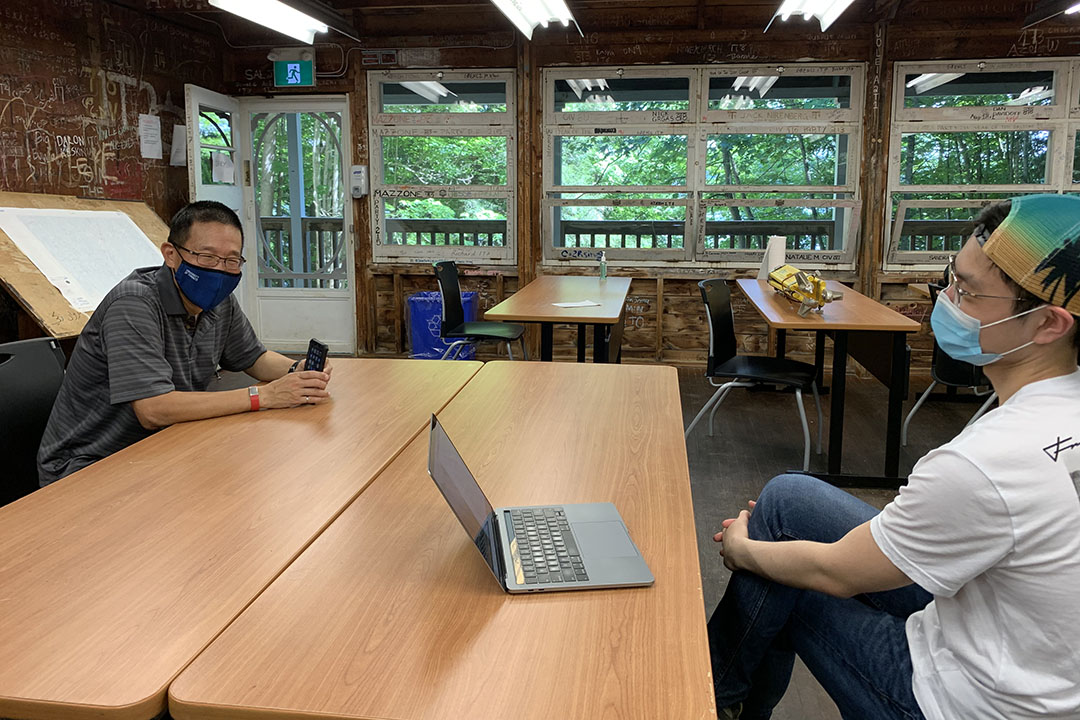During the week of August 14, the Faculty of Applied Science & Engineering (FASE) held their first in-person course since March 13, 2020.
The course, CME358 — Civil and Mineral Practicals, also known as CAMP, was held at U of T’s Survey Camp near Minden, ON after having been cancelled last year due to the pandemic.
The faculty decided that alternative delivery methods are not feasible for the course because of its field-based nature. CAMP is a graduation requirement for both civil and mineral engineering students.
CAMP is normally offered in August with the option of two consecutive two-week sessions. This year’s sessions were halved to one week each because of COVID-19 risk, and there were three sessions scheduled because of each session’s lowered student capacity.
Students who need to take CAMP to graduate in June 2022 were given priority to register this year. Remaining spots were offered to incoming third-year students on a first-come-first-served basis.
COVID-19 precautions
Organizers took numerous precautionary measures to ensure attendees’ health and safety, given the ongoing global pandemic and the risk presented by the fourth wave. All attendees were required to have at least one dose of a COVID-19 vaccine to register for the course. Students were also required to take a COVID-19 rapid test before boarding the bus departing from UTSG, oro t take the test on the campsite before interacting with others if they arrived individually.
“The department and all the [professors] that are running this camp have put in a lot of work to make sure they’re following current protocols and make sure that everything is going as safely as they can, while still giving you guys a good learning experience,” said Felicia Liu, one of the teaching assistants of CAMP.
Group activities were divided into cohorts of three to four students, and students were expected to work in the same cohort for most course activities. Masks were worn at all times except when eating and sleeping, and N95 masks, hand sanitizer, and disinfectant wipes were supplied to students.
A tent was used for outdoor dining and some classes in order to maintain social distancing and to improve air circulation. Student capacity in the living space was also reduced, with three to four students of the same cohort occupying each bunkhouse room designed to accommodate 16 people.
“Everything is really taken care of for you,” said Desmond Hutchinson, a fourth-year civil engineering student, about the COVID-19 measures on the campsite.
In-person learning experience
“It’s just better to be able to experience things in person,” said Matthew Vidale, a civil engineering undergraduate student currently in the Professional Experience Year Co-op Program. He added, “it’s hard to really convey a question you have and what confusion you’re having [online].”
Vidale said that having hands-on experience and actually seeing the processes and calculations unfold can be very helpful. “When you’re in a classroom, it’s easy to lose sight of exactly why you’re doing what you’re doing, and that’s never the case when you’re physically seeing the process,” he said.
Vidale also mentioned that the teaching team delivered material gradually, given students are back in person for the first time and because of the complexity of field-based knowledge. “They’ve done a great job of explaining things at the level that we can understand… not only because it’s the first time back, but because of the topics that we’re doing,” he said.
Joseph Kamangu, a third-year civil engineering student, agreed that in-person classes like CAMP facilitated learning better than online ones by allowing more “face-to-face interaction.” He added that the course also allows students to develop hands-on practical skills, something he considers essential for engineers.
“I am very much looking forward to getting back on campus,” said Kamangu when asked about how the experience at CAMP made him feel about returning to campus in the fall.
“A big shift”
Christopher Yip, dean of the FASE, said it is critical to get back to in-person activities, as people, even if they’re used to it, are tired of doing things online. “I think one of the key things for this, at some level, is getting people used to doing stuff in person again. I think that’s probably the most important thing,” said Yip.
“There is going to be a big mental shift for people…. How do you learn? I think that’s the key,” said Yip. “Everybody’s gonna learn how to learn.”
When asked about the faculty’s plan about returning to campus in the fall semester, Yip said he is confident in the faculty’s ability to manage the in-person semester. He noted that numerous COVID-19 protocols have been in place for a long time, including enhanced cleaning, mask mandates, and capacity limits.
“I think, you know, the faculties are prepared, the staff are prepared. We think students are keen to come back,” said Yip.
Yip acknowledged that there are things that the faculty is unable to control, and that preparing to deal with unexpected situations is critical. He recalled a year ago when the faculty shifted online over one weekend after a global pandemic was declared. “All sorts of stuff can happen. And so you have to be prepared to deal with perturbations that show up,” said Yip.
He said coming back may present more challenges as more variables are out of the faculty’s control. “This isn’t like a room had a fire, and you fix a room,” said Yip. “This is a situation where the timelines and current durations and parameters that affect how well something comes back are just constantly changing.”
Still, Yip is optimistic about an in-person fall at U of T Engineering, saying the community is ready and excited to welcome everyone back. “We are all looking forward to seeing everybody come back. We want to make sure that the fall is as smooth as possible,” said Yip.


